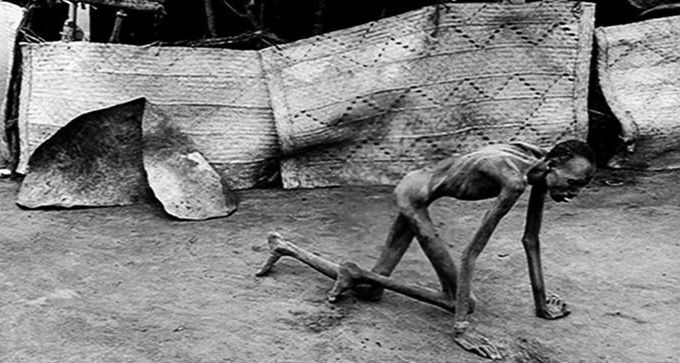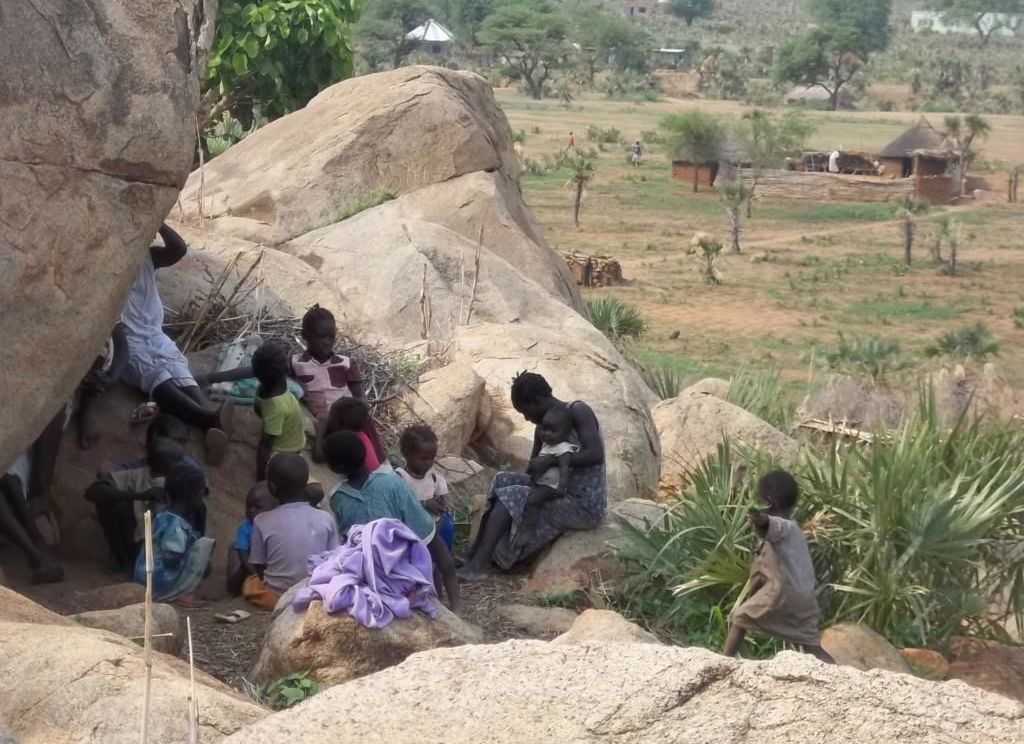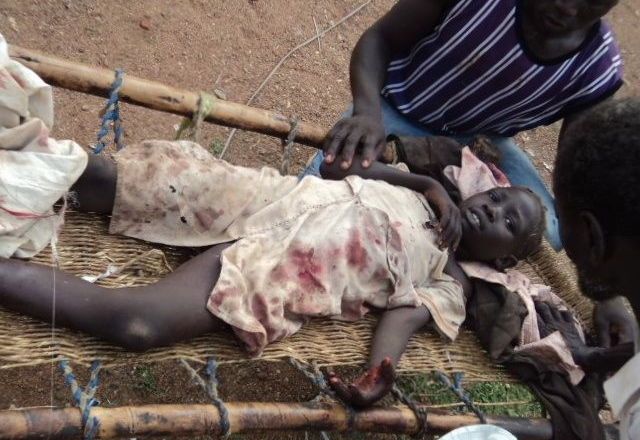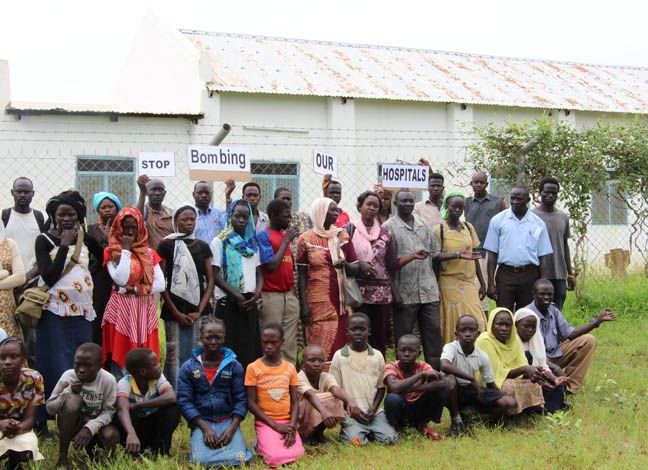“Khartoum Announces a Campaign to ‘Starve’ the People of the Nuba Mountains,” Eric Reeves, The Huffington Post, October 7, 2014 .
http://www.huffingtonpost.com/eric-reeves/khartoum-announces-a-camp_b_5923470.html
On 22 September 2014 I received from a source within Sudan, whom I trust implicitly, a truly extraordinary, indeed explosive document, containing “Minutes of the Military and Security Committee Meeting held in the National Defense College [Khartoum]”; the meeting referred to took place on August 31, 2014; the date of the minutes for the document is September 1, 2014 (Sunday).
What makes the document so extraordinary–beyond the extreme danger individuals put themselves in to ensure I received a copy—is that it reveals the participation of the regime’s most senior military and security officials, expressing themselves freely, and in the process disclosing numerous highly consequential policy decisions, internal and external. We learn also of the appalling cruelty and destructiveness of these decisions. Allowing for the very different historical contexts, it’s as though we were reading minutes from the Wannsee Conference of 1942, in which the destruction of European Jewry was confirmed and extended throughout the German governing apparatus.
If the comparison seems too extreme, bear in mind that during the twenty-five years of rule by the current National Islamic Front/National Congress Party regime, more than three million people have been killed in Darfur, South Sudan, as well as the Nuba Mountains of South Kordofan, and Blue Nile State. Most have died not directly from violence but rather from the consequences of that violence, which has been consistently marked by a decided racial and ethnic inflection. Khartoum’s view has always been that the African populations of greater Sudan (Sudan as well as the newly independent South Sudan) are lower forms of human life—worthy only of being abid. The Arabic word is translated literally as slave(s) but carries with it many of the connotations of the hateful English word “nigger.” And slavery has in fact been a means of conducting war, as the distinguished South Sudanese academic Jok Madut Jok argues in his terrifying account, War and Slavery in Sudan (2001).
The rape and gang-rape of women and girls is also a weapon of war, particularly in Darfur where Khartoum’s militia forces have sexually assaulted many tens of thousands; we will never have an adequate figure for how many–or how many eventually lost their lives or their will to live because of the savagery of gang-rape, especially of young girls. The rapes are typically the occasion for expressing a ghastly “Arab supremacism”; for what is striking about these assaults is that they have typically been accompanied by racial epithets, including abid, but also zurga (dirty or blue-black), and “Nuba”—a broadly derogatory for African people, growing out of the assumption that all the people of the Nuba Mountains are African.
Notably, it was the Nuba people who were subject to a campaign of near total ethnic destruction in the 1990s: assaulted militarily–with no distinction between combatants and civilians—they were also subject to a total humanitarian embargo: no international relief supplies or personnel were allowed in, even as people were starving.
Which brings us back to the present and the minutes of the August 31 meeting. Two military officials of the regime speak explicitly of accelerating a bombing campaign directed against the agricultural production of the Nuba people, a campaign that has been underway for more than three years. Moreover, the international community has again acquiesced before Khartoum’s total embargo on humanitarian relief to rebel-controlled areas. In the Nuba Mountains of South Kordofan and in Blue Nile State to the east, perhaps 1.5 million people have been displaced and have acute humanitarian needs: food, primary medical care, and above all, an end to the aerial bombardment that has terrified people to the point that they can no longer work their fields. They live in caves and ravines; villages are relentlessly attacked on the ground, with foodstocks the primary target for destruction. Many thousands have died.
If this seems too indirect or abstract an account, not getting sufficiently at the vexed issue of “genocidal intent,” then consider the words of two senior generals at the August 31 meeting (only two of those present did not have the most senior military rank). Lt. General Siddiig Aamir, Director of Military Intelligence and Security, was blunt:
“This year the Sudan People’s Army (SPLA-N) managed to cultivate large areas in South Kordofan State. We must not allow them to harvest these crops. We should prevent them. Good harvest means supplies to the war effort. We must starve them, so that, commanders and civilians desert them and we recruit the deserters to use them in the war to defeat the rebels” (page 10 of English translation of minutes).
What “starving” people look like: photograph by the incomparable James Nachtwey, from an earlier Khartoum-engineered famine in South Sudan
“We must starve them.” He is speaking of hundreds of thousands of civilians, for of course this ruthless assessment neglects to point out that the vast majority of agricultural production is a civilian undertaking, and that it will be Nuba civilians–primarily children, women, and the elderly–who will suffer most from this destruction of food supplies, not the rebels. Even more blunt are the words of Lt. General Imadadiin Adaw, Chief of Joint Operations: “We should attack them before the harvest and bombard their food stores and block them completely” (page 14).
Civilians must flee to caves or ravines for safety from the bombing, mainly by highly inaccurate retrofitted (Russian) Antonov cargo planes; agricultural production has dropped precipitously
How can this be ignored? How can this Sudanese “Wannsee Conference”—made public by virtue of the leaked minutes of this extraordinary meeting–not be the occasion for the most robust warning to Khartoum not to pursue this campaign of starvation and ethnic annihilation?
The minutes of the meeting also make clear Khartoum’s intention to supply strategically significant military supplies, equipment, and training to one side of the bloody civil war in South Sudan, ensuring that this enormously destructive conflict is protracted and that peace negotiations will falter as the newly equipped rebel group fights on against the government in Juba. It is a page out of Khartoum’s standard genocidal playbook: “divide and conquer.” Southerners killing Southerners still serves what these men consider to be in Sudan’s (i.e., their) national interest, especially given the location of the very large oil reserves in the South’s Upper Nile State, where fighting is increasingly intense.
There is much, much more in this terrifying document. Especially significant is Khartoum’s relationship to militant Islam and its readiness to use Islamic terrorism as a strategic element of foreign policy: First Lt. Gen. Hashim Abdalla Mohammed, Chief of Joint General Staff, declares with confidence: “We can create them a problem with the Islamic radicals, but we are not going to use this card now” (page 17). But certainly the “card” is there to play.
The U.S. intelligence community assumes in its shady relationship with Khartoum that it is getting valuable regional information about terrorism; what this document reveals is that the regime is highly selective in what it provides, and exacts a shameful price from its partners in the U.S. intelligence community, namely betrayal of the rebel movements seeking to overthrow Khartoum’s tyranny of 25 years. This is the only way to interpret what First Lt. General and Defense Minister Abdel Rahim Mohamed Hussein bluntly declares: “We release only limited information to the Americans [and are guided by their specific requests], and the price is the armed movements file” (page 24). Some of those leading the “armed movements” are among the most honorable, principled, and determined Sudanese I know.
Yet another victim of Khartoum’s bombing campaigns; thee have been tens of thousands
Anyone reading this document, whose authenticity has been established beyond reasonable doubt, will find some hard questions about Obama administration policies toward Khartoum. First and foremost, are we really prepared to accept the deliberate aerial destruction of the Nuba people? Aerial attacks on civilians have been a mainstay of Khartoum’s war against peripheral and marginalized groups—in what is now South Sudan, in Darfur, in Blue Nile, and most conspicuously in the Nuba Mountains. Will anything be done to stop this explicitly declared campaign of “starvation”? Although well aware of its existence, the Obama administration has so far said not a word about the document announcing this campaign. The administration has been assisted by news media silence. How long will this silence persist? How many children must starve to death before the President, Western allies, and news organizations respond meaningfully?
That such a plea should be necessary…
[Eric Reeves, a professor at Smith College, has published extensively on Sudan, nationally and internationally, for more than fifteen years. He is author of Compromising with Evil: An archival history of greater Sudan, 2007 – 2012 (September 2012)]



